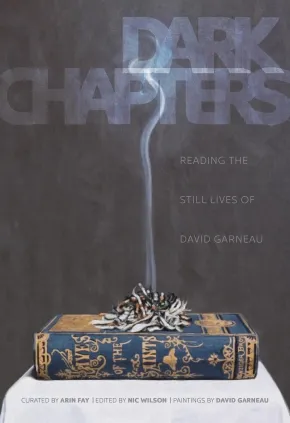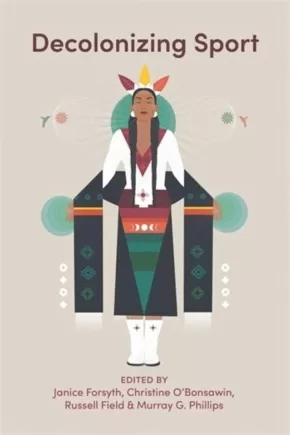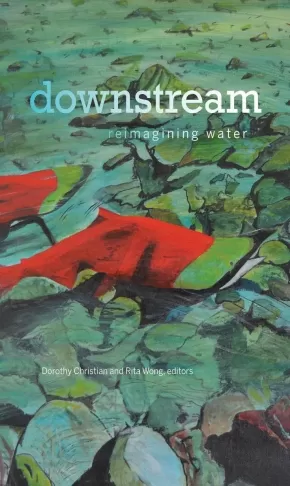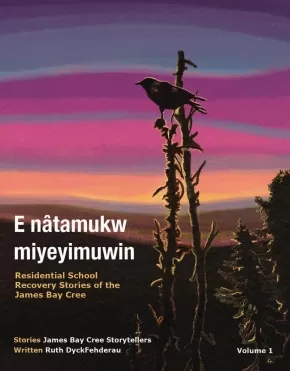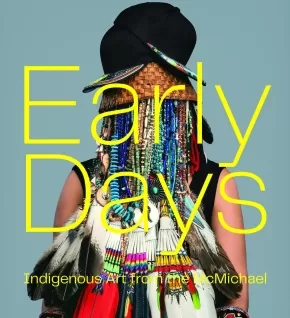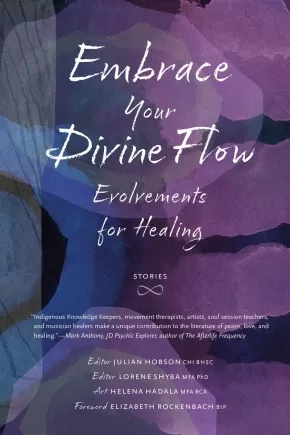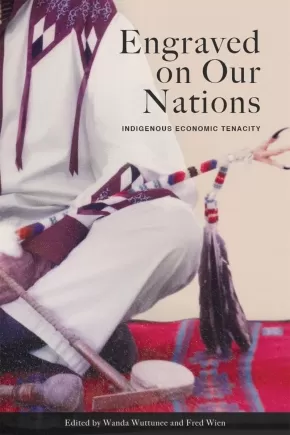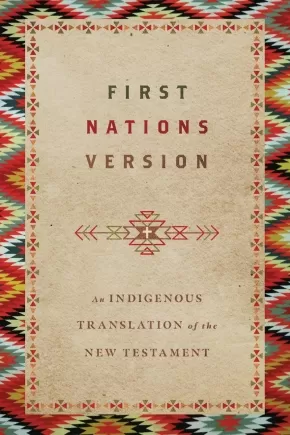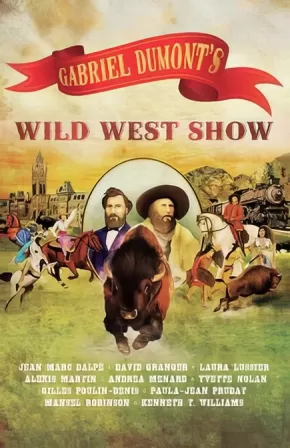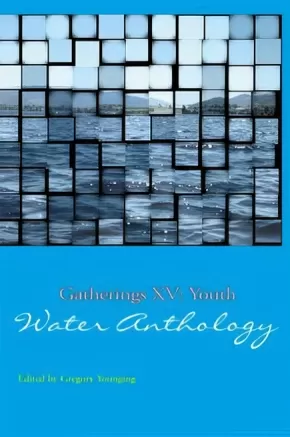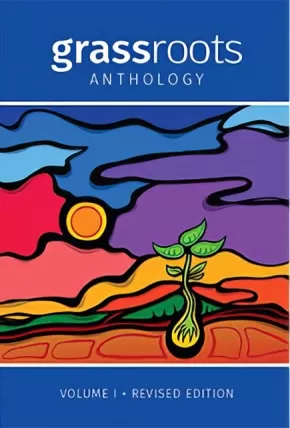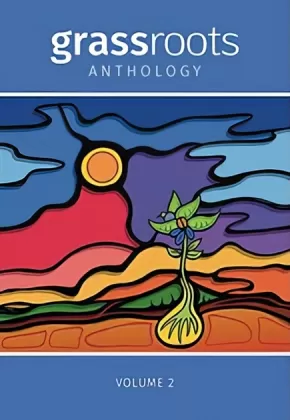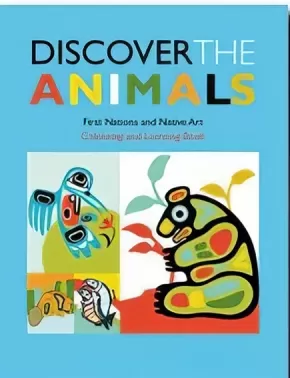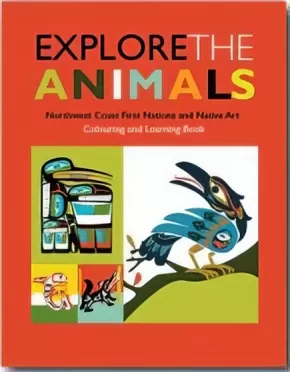
Various Indigenous Contributors
Books (10)
Dangling in the Glimmer of Hope: Academic Action on Truth and Reconciliation
$41.95
Format:
Paperback
Text Content Territories:
Indigenous Canadian;
ISBN / Barcode: 9780776644660
Synopsis:
Synopsis:
Dangling in the Glimmer of Hope: Academic Action on Truth and Reconciliation demonstrates actions academics have taken in relation to some of the Calls to Action of the Truth and Reconciliation Commission. Poetry, short stories, and children’s stories sit alongside scholarly chapters, mixing personal and academic voices to challenge and engage both the head and the heart about what Truth and Reconciliation—and the Calls to Action—require of us all.
Garry Gottfriedson, Victoria Handford, and their collaborators invite readers not only to explore the diverse facets of Indigenous identity, but also to embark on a transformative, collective journey towards mutual understanding and respect.
Contributions by Dorothy Cucw-la7 Christian, Georgann Cope Watson, Garry Gottfriedson, Victoria (Tory) Handford, Sarah Ladd, Patricia Liu Baergen, Tina Matthew, Rod McCormick, Gloria Ramirez, Fred Schaub, and Bernita Wienhold-Leahy.
Educator Information
Table of Contents
Land Acknowledgement
In Your Canada—A Thousand and Counting by Garry Gottfriedson
About the Cover Photograph
List of Poems
List of Figures
List of Tables
Foreword by Dorothy Cucw-la7 Christian
Introduction by Garry Gottfriedson and Victoria Handford
SECTION 1
Language and Culture Calls to Action
Returning from School by Garry Gottfriedson
Disrupting Colonial Practices through Indigenous Language Learning and Research by Gloria Ramirez
SECTION 2
Health Calls to Action
lessons by Garry Gottfriedson
Grave Concerns by Rod McCormick
A Walk Together by Bernita Wienhold-Leahy
Health Care Practices by Bernita Wienhold-Leahy
SECTION 3
Education for Reconciliation Calls to Action
KIRS Curriculum by Garry Gottfriedson
Change Begins with a Whisper by Georgann Cope Watson
SECTION 4
Business and Reconciliation Calls to Action
Too Much by Sarah Ladd
Cultural Dissonance: Job Interviewing and Indigenous Candidates by Sarah Ladd
SECTION 5
Commemoration Calls to Action
An Unholy Act by Garry Gottfriedson
Debwewin by Victoria Handford
Red Bridge by Victoria Handford
SECTION 6
Newcomers to Canada Calls to Action
The Flesh of Ice by Garry Gottfriedson
Encounters by Fred Schaub
Reconciliation and Decolonization: From the Shadows of Settler Shame to the Generosity of an Ethical Relationality by Fred Schaub
Exploring Curriculum as a Lived Experience of Poetic Dwelling in between Place Stories by Patricia Liu Baergen
Afterword by Tina Matthew
Contributors
Appendices
Additional Information
232 pages | 6.00" x 9.00" | 20 photos | Paperback
Dark Chapters: Reading the Still Lives of David Garneau
$32.95
Artists:
Editors:
● Arin Fay
Format:
Paperback
Text Content Territories:
Indigenous Canadian; Métis;
ISBN / Barcode: 9781779400536
Synopsis:
Synopsis:
A singular collection of responses to the still life paintings of acclaimed artist David Garneau
Dark Chapters brings together 17 poets, fiction writers, curators, and critics to engage with the works of David Garneau, the Governor General’s Award-winning Métis artist. Featuring paintings from Garneau’s still life series “Dark Chapters” alongside poetry, fiction, critical analysis, and autotheory, the book includes contributions from Fred Wah, Paul Seesequasis, Jesse Wente, Lillian Allen, Billy-Ray Belcourt, Larissa Lai, Susan Musgrave, and more.
A nod to the Reports of Truth and Reconciliation Commission, in which Justice Murray Sinclair describes the residential school system as “one of the darkest, most troubling chapters in our nation’s history,” Garneau’s still life paintings combine common objects (books, bones, teacups, mirrors) and less familiar ones (a Métis sash, a stone hammer, a braid of sweetgrass) to reflect the complexity of contemporary Indigenous experiences. Provocative titles like “Métis in the Academy” and “Smudge Before Reading” invite consideration of the mixed influences and loyalties faced by Indigenous students and scholars. Other paintings explore colonialism, vertical and lateral violence, Christian influence on traditional knowledge, and museum treatment of Indigenous belongings.
Rooted in Garneau’s life-long engagement at the intersections of visual art and writing, Dark Chapters presents a multifaceted reflection on the work of an inimitable, unparalleled artist.
Includes contributions from Arin Fay, Billy-Ray Belcourt, Cecily Nicholson, David Howes, Dick Averns, Fred Wah, Jeff Derksen, Jesse Wente, John G. Hampton, Larissa Lai, Lillian Allen, Paul Seesequasis, Peter Morin, Rita Bouvier, Susan Musgrave, Tarene Thomas, and Trevor Herriot.
Reviews
“A smart collection of art and essays, Dark Chapters activates deep conversations about art, resistance, and sovereignty. Visiting with paintings by Métis artist David Garneau, seventeen poets, curators, and thinkers offer complex provocations that trouble and activate new forms of communities and relationships.” —Dr. Carmen Robertson, Canada Research Chair in North American Indigenous Visual and Material Culture
“Provocative, probing, and precarious, Dark Chapters pairs the poetic, literary, political, and critical responses of seventeen authors with the deceptively uncluttered yet gravid and combustible still lifes of David Garneau. This collection of pictures and words undertakes a necessary examination of the uncanny oppositions and disquieting literal and symbolic inversions that signify and animate the Indigenous history of Canada.” —Bonnie Devine
“Dark Chapters is a lesson in relationality and innovation. Built through conversations between Garneau’s work and artists/writers, the intergenerational contributors to this book come together in relation to Garneau and his still lives to explore the important contribution the artist has made to Canadian, Indigenous, and International art.” —Erin Sutherland
Educator Information
Table of Contents
Foreword
Nic Wilson
Still Life
John G. Hampton
Stone and Rock: I Have Failed You
Peter Morin
Wander Carried
Cecily Nicholson
On Kinship
Paul Seesequasis
Learning from Indigenous Academic Solidarity
Jeff Derksen
Knock Knock
Lillian Allen
Unsettling the Colonial Gaze
Trevor Herriot
Smudge Before Reading and The Land Does Not Forget
Tarene Thomas
Confession (after David Garneau) by Rita Bouvier
Fuse and Formal and Informal Education
Jesse Wente
The Problem with Pleasure
Billy-Ray Belcourt
Métis Realism: On the Materiality of Smoke and Relationality of Rocks
David Howes
Allies (after Hsieh and Montano)
Larissa Lai
Ally Tear Reliquary
Arin Fay
Understanding Attempted Enlightening: Between Language as Power…and Light as Life
Dick Averns
Spine
Fred Wah
The Resting Heartbeat of a Wounded Bird
Susan Musgrave
Gallery
About the Artist
About the Curator
About the Editor
About the Contributors
List of Artworks
Index
Additional Information
160 pages | 6.50" x 9.50" | 58 colour illustrations | Paperback
Decolonizing Sport
$29.00
Format:
Paperback
Text Content Territories:
Indigenous Peoples in Africa; Indigenous New Zealander; Indigenous Canadian; Indigenous Australian; Indigenous American; Indigenous;
Reading Level: N/A
ISBN / Barcode: 9781773636344
Synopsis:
Synopsis:
Indigenous Peoples have taken physical recreational activity – sport – back from the colonizers. One of very few books to show the two edges of sport: it colonized but is now decolonizing.
Decolonizing Sport tells the stories of sport colonizing Indigenous Peoples and of Indigenous Peoples using sport to decolonize. Spanning several lands — Turtle Island, the US, Australia, Aotearoa/New Zealand and Kenya — the authors demonstrate the two sharp edges of sport in the history of colonialism. Colonizers used sport, their own and Indigenous recreational activities they appropriated, as part of the process of dispossession of land and culture. Indigenous mascots and team names, hockey at residential schools, lacrosse and many other examples show the subjugating force of sport. Yet, Indigenous Peoples used sport, playing their own games and those of the colonizers, including hockey, horse racing and fishing, and subverting colonial sport rules as liberation from colonialism. This collection stands apart from recent publications in the area of sport with its focus on Indigenous Peoples, sport and decolonization, as well as in imagining a new way forward.
Educator Information
Table of Contents
Sport, Colonialism and Decolonization (Janice Forsyth, Christine O’Bonsawin, Murray G. Phillips and Russell Field)
Section 1: Storytelling Beyond Competition: An Indigenous Perspective on Organized Sport (Brian Rice)
More Than a Mascot: How the Mascot Debate Erases Indigenous People in Sport (Natalie Welch)
Section 2: Interrogating the Archive Witnessing Painful Pasts: Understanding Images of Sports at Canadian Indian Residential Schools (Taylor McKee and Janice Forsyth)
On the Absence of Indigenous Moving Bodies: Whiteness, Decolonization and Indigenous/Indigenizing Sport History (Malcolm MacLean)
Section 3: Rights and Reconciliation # 87: Reconciliation, Sport History and Indigenous Peoples in Canada (Victoria Paraschak)
Taken at Face Value: The Legal Feasibility of Indigenous-Led Olympic Games (Christine O’Bonsawin)
Section 4: Settler Colonialism Canoe Races to Fishing Guides: Sport and Settler Colonialism in Mi’kma’ki (John Reid)
Moments of Transcending Colonialism? Rodeos and Races in Lethbridge (Robert Kossuth)
“Men Pride Themselves on Feats of Endurance”: Masculinities and Movement Cultures in Kenyan Running History (Michelle M. Sikes)
Section 5: Resistance and Activism Stealing, Drinking and Non-Cooperation: Sport, Everyday Resistance in Aboriginal Settlements in Australia (Gary Osmond)
Let’s Make Baseball! Practices of Unsettling on the Recreational Ball Diamonds of Tkaronto/Toronto (Craig Fortier and Colin Hastings)
Subjugating and Liberating at Once: Indigenous Sport History as a Double Edged Sword (Brendan Hokowhitu)
Additional Information
256 pages | 6.00" x 9.00" | Paperback
downstream: reimagining water
$36.99
Format:
Paperback
Text Content Territories:
Indigenous Canadian;
ISBN / Barcode: 9781771122139
Synopsis:
Synopsis:
downstream: reimagining water brings together artists, writers, scientists, scholars, environmentalists, and activists who understand that our shared human need for clean water is crucial to building peace and good relationships with one another and the planet. This book explores the key roles that culture, arts, and the humanities play in supporting healthy water-based ecology and provides local, global, and Indigenous perspectives on water that help to guide our societies in a time of global warming. The contributions range from practical to visionary, and each of the four sections closes with a poem to encourage personal freedom along with collective care.
This book contributes to the formation of an intergenerational, culturally inclusive, participatory water ethic. Such an ethic arises from intellectual courage, spiritual responsibilities, practical knowledge, and deep appreciation for human dependence on water for a meaningful quality of life. downstream illuminates how water teaches us interdependence with other humans and living creatures, both near and far.
Reviews
"Downstream stakes out a bold and creative claim to collaborative and cross-cultural eco-spiritual-neo-traditional knowing and, with it, new approaches to policy and action. A timely read that lends depth and resonance to some of the material and voices [in other books on the subject]." — Heather Menzies, Literary Review of Canada, June 2017
"This rich collection brings together the work of artists, writers, scientists, scholars, environmentalists, and activists, all focusing on the looming global water crisis. ... Writing styles vary from piece to piece throughout the book—poetic, personal, journalistic, and academic—but the shifts between each are well worth navigating for any reader interested in human futures on Earth."— Publishers Weekly, August 2017
"This collection of works successfully expands our knowledge of and experience with water by merging natural science, social science, arts, and humanities approaches to water. It offers new, innovative, and engaging ways to think about and experience water, especially as it relates to life and vitality."— Sara Beth Keough, American Review of Canadian Studies, November -0001
Educator Information
This collection of essays is useful for these course/subject areas or topics: Language Arts & Disciplines; Creative Writing; Indigenous Studies; Poetry; Environmental Studies; Environmental Humanities.
Table of Contents
Introduction: Re-storying Waters, Re-storying Relations / Rita Wong and Dorothy Christian
Part I: Contexts for Knowing and Unknowing Water
1. Planetary Distress Signals / Alanna Mitchell
2. Water / Lee Maracle
3. Interweaving Water: The Incremental Transformation of Sovereign Knowledge into Collaborative Knowledge / Michael D. Blackstock
4. Water and Knowledge / Astrida Neimanis
5. Excerpts from “a child’s fable” / Baco Ohama
Part II: Water Testimonies: Witness, Worry, and Work
6. Water: The First Foundation of Life / Mona Polacca
7. From Our Homelands to the Tar Sands / Melina Laboucan Massimo
8. Keepers of the Water: Nishnaabe-kwewag Speaking for the Water / Renee Elizabeth Mzinegiizhigo-kwe Bedard
9. Water Walk Pedagogy / Violet Caibaiosai
10. A Response to Pascua Lama / Cecilia Vicuna
Part III: Shared Ethical and Embodied Practices
11. Moving with Water: Relationship and Responsibilities / Alannah Young Leon and Denise Marie Nadeau
12. Bodies of Water: Meaning in Movement / Seonagh Odhiambo Horne
13. Upstream: A Conversation with Water / Cathy Stubington
14. Ice Receding, Books Reseeding / Basia Irland
15. Tsunami Chant / Wang Ping
Part IV: A Respectful Co-existence in Common: Water Perspectives
16. Listening to the Elders at the Keepers of the Water Gathering /Radha D’Souza
17. Coastal Waters in Distress from Excessive Nutrients / Paul J. Harrison
18. Bodies of Water: Asian Canadians In/Action with Water /Janey Lew
19. Permeable Toronto: A Hydro-Eutopia / Janine MacLeod
20. Saturate/Dissolve: Water for Itself, Un-Settler Responsibilities, and Radical Humility / Larissa Lai
21. Bring Me Back / Janet Rogers
Additional Information
300 pages | 6.00" x 9.00"
E nâtamukw miyeyimuwin: Residential School Recovery Stories of the James Bay Cree, Volume 1
$29.99
Format:
Paperback
Text Content Territories:
Indigenous Canadian; First Nations; Cree (Nehiyawak); James Bay Cree;
Reading Level: N/A
ISBN / Barcode: 9781989796238
Synopsis:
Synopsis:
In this quietly powerful and deeply human book, Ruth DyckFehderau and twenty-one James Bay Cree storytellers put a face to Canada’s Indian Residential School cultural genocide.
Through intimate personal stories of trauma, loss, recovery, and joy, they tell of experiences in the residential schools themselves, in the homes when the children were taken, and on the territory after survivors returned and worked to recover from their experiences and to live with dignity. The prose is clear and accessible, the stories remarkably individual, the detail vivid but not sensational.
Together they reveal the astonishing courage and strength of children along with the complexity and myriad methods of their oppressors. A tough, often funny, and ultimately uplifting book that’s not quite like anything else out there.
This book is published by Cree Board of Health and Social Services of James Bay and distributed by WLU Press.
Reviews
“These previously unwritten stories of lived, traumatized experiences are testament to the storytellers’ courage and strength and resilience. When the rich Cree traditional and spiritual relationship with land and with family is harmed by separation, hatred, and fear - a harm resulting in anger and loss of values, identity, and self-worth - these storytellers find ways to heal. Through their stories, you learn about culture as treatment, about the power of forgiveness and love, and about peaceful co-existence in community as essential to healing, belief, and advancing true reconciliation.” —Chief Willie Littlechild, Ermineskin Cree Nation, Former Truth and Reconciliation Commissioner, Former residential school student athlete, Order of Canada; Order of Sport, Member of Sports Halls of Fame, Canada and North America
“These Cree stories, told with utmost respect and a feeling of safety, are gifts. They are medicine.” —Joanna Campiou, Woodland/Plains Cree Knowledge Keeper
“This is a difficult but necessary book. There’s a power to truth and to the realities of the Indian Residential School system, but for those wanting to see strength and movement toward hope, this is the book for you. These stories hold that hope close to the heart. What shines through is a love of the land, a love of community, a love of the Cree language, a love of family – exactly what colonial forces like the IRS system tried to destroy but couldn’t.” —Conor Kerr, Metis/Ukrainian author, Avenue of Champions, Giller Prize longlist
Additional Information
320 pages | 7.00" x 9.00" | Paperback
Early Days: Indigenous Art from the McMichael
$70.00
Artists:
Format:
Hardcover
Text Content Territories:
Indigenous Canadian;
ISBN / Barcode: 9781773272337
Synopsis:
Synopsis:
A landmark publication bringing together more than seventy voices illuminating the rich array of Indigenous art held by the McMichael Canadian Art Collection.
Under the editorial direction of Anishinaabe artist and scholar Bonnie Devine, Early Days gathers the insights of myriad Indigenous cultural stakeholders, informing us on everything from goose hunting techniques, to the history of Northwest Coast mask-making, to the emergence of the Woodland style of painting and printmaking, to the challenges of art making in the Arctic, to the latest developments in contemporary art by Indigenous peoples from across Turtle Island.
Splendidly illustrated, Early Days not only tells the story of a leading collection but also traces the emergence and increasing participation of many Indigenous artists in the contemporary art world. This publication will be the largest in the history of the McMichael, and represents a vital acknowledgment of the place of Indigenous art and ways of knowing in global art history.
Featured contributors: Barry Ace, Leland Bell, Dempsey Bob, Christian Chapman, Violet Chum, Hannah Claus, Dana Claxton, Jisgang Nika Collison, Alan Corbiere, Marcia Crosby, Ruth Cuthand, Mique'l Dangeli, Joe David, Sarah Davidson, Robert Davidson, Bonnie Devine, Tarralik Duffy, Norma Dunning, David Garneau, John Geoghegan, Janice Grey, Haay'uups (Ron Hamilton), Jim Hart, Emma Hassencahl-Perley, Emily Henderson, Lynn A. Hill, Richard Hill, Maria Hupfield, Jaimie Isaac, Heather Igoliorte, Luis Jacob, Gayle Kabloona, William Kingfisher, Jessica Kotierk, Robin Laurence, Duane Linklater, Ange Loft, Tanya Lukin Linklater, Jean Marshal, Michael Massie, Gerald McMaster, Ossie Michelin, Sarah Milroy, Antoine Mountain, Nadia Myre, Jeneen Frei Njootli, Ruth Phillips, Jocelyn Piirainen, Ryan Rice, Carmen Robertson, Paul Seesequasis, Leanne Betasamosake Simpson, Wedlidi Speck, Clyde Tallio, Drew Hayden Taylor, Nakkita Trimble-Wilson, Jesse Tungilik, Camille Georgeson Usher, William Wasden Jr., Jordan Wilson, Jessica Winters.
Additional Information
400 pages | 11.00" x 10.00" | 200 Colour Photographs | Hardcover
Embrace Your Divine Flow: Evolvements for Healing
$32.50
Editors:
Format:
Paperback
Text Content Territories:
Indigenous Canadian;
Reading Level: N/A
ISBN / Barcode: 9781990735097
Synopsis:
Synopsis:
Embrace Your Divine Flow is filled with inspiring “evolvement” stories and art that beautifully convey how love, light, and adventure can spark awareness and peace in your life. The thought-provoking exercises guide you on a path toward uncovering your own truth, as revealed through the impactful offerings of the artist and authors.
Created by a collective of spiritual practitioners, the substantive investigation asked of contributors was: “What is your connection to the divine — whether it be God, the source, the light, the power of the universe, or Newet’sine, the Creator? How does this connection to the divine flow a path of least resistance along your river of life and beyond, and how might you share this?” Authors’ themes include sacred places, sound and sensuality, protection, infinity, authenticity, spirits, and gratitude.
Reviews
“An inspiring book. This diverse collective of spiritual practitioners, from Indigenous Knowledge Keepers to movement therapists, artists, soul session teachers, and musician healers make a unique contribution to the literature and explorations of peace, love, and healing.”- Mark Anthony, JD Psychic Explorer, author of The Afterlife Frequency, Evidence of Eternity and Never Letting Go
Educator Information
Contains some Indigenous content/contributions.
Additional Information
256 pages | 6.00" x 9.00" | 18 Colour Illustrations | Paperback
Engraved on Our Nations: Indigenous Economic Tenacity
$29.95
Format:
Paperback
Text Content Territories:
Indigenous Canadian; First Nations; Métis;
Reading Level: N/A
ISBN / Barcode: 9781772840643
Synopsis:
Synopsis:
A testimony to Indigenous resilience in business.
Despite investments in nation building, self-autonomy, and cultural resurgence, Indigenous economic development has remained an underexplored and underestimated area of research. Engraved on Our Nations overturns the discouraging deficit perspective too common in policy and academia and amplifies the largely undocumented history of successful Indigenous economic activity in Canada.
Following David Newhouse’s overview of Indigenous economic history, the authors of this collection illustrate how First Nation and Métis individuals and communities have met and overcome an array of challenges. Case studies focus on First Nations from Membertou (Nova Scotia) to Tahltan (British Columbia) and Indigenous-led enterprises like McDonald Brothers Electric (Northwest Territories) and Neechi Commons (Manitoba). Simultaneously celebrating Indigenous entrepreneurs and exploring concerns around sustainable development, the book also asks: can capitalism be Indigenized?
This first-of-its-kind collection shares stories not only of entrepreneurial excellence and persistence but savvy leadership, innovation, and reciprocity. In doing so, Engraved on Our Nations provides hope to Indigenous business leaders, youth, and elected officials working on the front lines to improve economic conditions and achieve "a good life" for their communities.
Reviews
“There are few books that can compare to this. The strengths-based approach used by each author is refreshing and will be of service to First Nations communities and to Indigenous and non-Indigenous scholars in community economic development.” — Shelley T. Price
“Engraved on Our Nations clearly articulates the strength, courage, and foresight of Indigenous people. The uplifting stories within this volume will open the eyes of readers and elicit hope, inspiration, and pride.” — Bob Kayseas
Educator Information
Table of Contents
Preface: Exploring Indigenous Economic Tenacity in Canada – Wanda Wuttunee and Fred Wien
Introduction: Indigenous Economic History as the History of Tenacity – David Newhouse
Part One: Strategic Leadership
1. How Does First Nation Social and Economic Development Contribute to the Surrounding Region? A Case Study of Membertou – Mary Beth Doucette and Fred Wien
2. Incremental Planning: The Tsawwassen First Nation Experience – Daniel M. Millette
3. Fulfilling Treaty Promises: Treaty Land Entitlement and Urban Reserves in Saskatchewan – Charlotte Bezamat-Mantes
Part Two: Culturally on Point
4. Trading on Tradition: Innovative Indigenous Enterprise – Isobel M. Findlay
5. Capitalism: Can It Be Indigenized? – Clifford Gordon Atleo
6. Challenges and Opportunities for BC First Nations’ Economic Self-Determination – J. Sayers
Part Three: Family Connections
7. Honouring Entrepreneurial Resilience: Atlantic Region Lifetime Achievers – Chris Googoo, Catherine Martin, and Fred Wien
8. A Métis Light in the Northern Darkness—Case Study – Wanda Wuttunee
9. Neechi Commons Case Study: A Lost Love Letter to Winnipeg – Wanda Wuttunee
Part Four: Partnering for Success
10. Tahltan Economic Tenacity—From Affluence to Poverty to Affluence – Jerry Asp
11. Stronger Together: First Nation Community/Municipality Collaborations – Wanda Wuttunee
Conclusion: What Did We Learn About Indigenous Tenacity? Fred Wien and Wanda Wuttunee
Acknowledgements
Contributors
Index
Additional Information
304 pages | 6.00" x 9.00" | Index, Bibliography | Paperback
First Nations Version: An Indigenous Translation of the New Testament
$28.99
Editors:
Format:
Paperback
Text Content Territories:
Indigenous Canadian; Indigenous American; Native American; Indigenous Central American; Indigenous Peoples in Mexico;
Reading Level: N/A
ISBN / Barcode: 9780830813506
Synopsis:
Synopsis:
A New Testament in English by Native North Americans for Native North Americans and All English-Speaking Peoples
Many First Nations tribes communicate with the cultural and linguistic thought patterns found in their original tongues. The First Nations Version (FNV) recounts the Creator's Story—the Christian Scriptures—following the tradition of Native storytellers' oral cultures. This way of speaking, with its simple yet profound beauty and rich cultural idioms, still resonates in the hearts of First Nations people.
The FNV is a dynamic equivalence translation of the New Testament that captures the simplicity, clarity, and beauty of Native storytellers in English, while remaining faithful to the original language of the Bible. The culmination of a rigorous five-year translation process, this new Bible translation is a collaboration between organizations like OneBook and Wycliffe Associates, Indigenous North Americans from over twenty-five different tribes, and a translation council that consisted of twelve Native North American elders, pastors, young adults, and men and women from different tribes and diverse geographic locations. Whether you are Native or not, you will experience the Scriptures in a fresh and new way.
Read these sample passages to get a taste of what you'll find inside:
"The Great Spirit loves this world of human beings so deeply he gave us his Son—the only Son who fully represents him. All who trust in him and his way will not come to a bad end, but will have the life of the world to come that never fades—full of beauty and harmony. Creator did not send his Son to decide against the people of this world, but to set them free from the worthless ways of the world." John 3:16-17
"Love is patient and kind. Love is never jealous. It does not brag or boast. It is not puffed up or big-headed. Love does not act in shameful ways, nor does it care only about itself. It is not hot-headed, nor does it keep track of wrongs done to it. Love is not happy with lies and injustice, but truth makes its heart glad. Love keeps walking even when carrying a heavy load. Love keeps trusting, never loses hope, and stands firm in hard times. The road of love has no end." 1 Corinthians 13:4-8
Reviews
"While Wildman recasts the New Testament in a distinctly Indigenous image, he remains faithful to evangelical interpretations of Christian scripture, typified in the many italicized explanations that appear throughout and are meant to add 'reasonably implied' clarifications and cultural notes, such as explication on ancient festivals like the Pentecost. This remarkable retelling offers plenty of rewards and will especially pique those open to a novel interpretation of the religious text." — Publishers Weekly starred review, August 2021
"Reading the First Nations Version of the New Testament is like listening to a wise elder pass down ancient teachings. Its oral cadences give the Scriptures new room to breathe. While contemporary translations focus on updating language in a modern mode, the FNV recaptures the sense of tradition that binds faithful readers to our past and to the story that tells us who we are. It is a good gift to everyone who walks the Jesus Way." — L. Daniel Hawk, professor of Old Testament and Hebrew at Ashland Theological Seminary
"From the beginning, the story of Jesus has been a translated story. Jesus spoke in Aramaic, but Matthew, Mark, Luke, and John wrote their Gospels in Greek. The story of Jesus is intended to be translated to every tribe, tongue, people, and nation. That translation is intended, not just permitted, serves to show how we must resist any cultural domination of the gospel. Terry Wildman has done a masterful job of rendering the New Testament into the storytelling motif characteristic of Native Americans. It should tell us something important when we realize how beautifully the story of Jesus can be adapted to the style and vocabulary of indigenous people. I deeply appreciate Terry Wildman's retelling of the story of Jesus for First Nations people. I believe the Great Spirit is pleased." — Brian Zahnd, pastor of Word of Life Church in St. Joseph, Missouri, and author of Beauty Will Save the World
"I've often wondered what it might look like if Jesus incarnated within another culture. Jesus, a first-century Jewish teacher in a corner of Rome's empire, lived, died, and rose as a human being within a specific time and place. What I love about the First Nations Version is how it translates this gospel story into a language of another context: First Nations! So get swept away into the story of the Great Spirit as he invites us to the blessing way of the good road. Read this beautiful retelling of the Scriptures that is not only beneficial for First Nations communities but for all who desire to allow the Great Spirit to transform their imaginations!" — Kurt Willems, pastor and auth
Educator Information
The First Nations Version (FNV) Translation Council consists of twelve First Nations individuals representing a cross-section of Native North Americans—elders, pastors, young adults, and men and women from differing tribes and diverse geographic locations. This council also represents a diversity of church and denominational traditions to minimize bias. The council determined the style and method of translation to be used and continues to be involved in ongoing translation, review, and cultural consultation. The FNV is a dynamic equivalence translation produced in partnership with Rain Ministries and OneBook Canada, with help from Wycliffe Associates.
AdditionalInformation
512 pages | 6.00" x 9.00" | Paperback
Gabriel Dumont's Wild West Show
$24.95
Format:
Paperback
Text Content Territories:
Indigenous Canadian; Métis;
Grade Levels: 12; University/College;
ISBN / Barcode: 9781772013191
Synopsis:
Synopsis:
Gabriel Dumont’s Wild West Show is a flamboyant epic, constructed as a series of tableaux, about the struggles of the Métis in the Canadian West. It is a multilayered and entertaining saga with a rodeo vibe, loosely based on Buffalo Bill’s legendary outdoor travelling show. In 1885, following the hanging of his friend Louis Riel, bison hunter Gabriel Dumont fled to the United States. There he was recruited by the legendary Buffalo Bill, founder of Buffalo Bill’s Wild West, a gigantic outdoor travelling show that re-enacted life in the American West. It made a huge impression on Dumont, and he dreamed of putting together a similar show to tell the story of the struggle of Canada’s Métis to reclaim their rights.
The creative team behind Gabriel Dumont’s Wild West Show – including ten authors, Indigenous and non-Indigenous, French- and English-speaking men and women – brings Dumont’s dream to life in a captivating, joyously anachronistic saga. The theatrical version of Gabriel Dumont’s Wild West Show presented by the National Arts Centre was one of a number of exceptional projects funded through the Canada Council for the Arts’ New Chapter initiative. (Adapted from nac-cna.ca/en/wildwestshow).
This is a bilingual book, co-published with Éditions Prise de parole, and enhanced with a historical background, a chronology of the Métis Resistances, and visual documents.
Reviews
“Really excellent. I laughed till I cried!” —Marilou Lamontagne, ICI Radio-Canada Ottawa-Gatineau
“[A] play that pleases, puzzles, and provokes, in a form that keeps shifting wildly from one moment to the next like a bucking bronco.”—J. Kelly Nestruck, Globe and Mail
“If Gabriel Dumont’s Wild West Show is so successful, while being funny and sad at the same time, it’s because the creative team did its research and listened to the communities involved in the rehabilitating of the figure of Gabriel Dumont. What takes shape here is a wave of madness and a rewriting of our national narrative.”—Maud Cucchi, JEU Revue de théâtre
“Gabriel Dumont’s Wild West Show is a crazed, fast-paced Métis 101 history lesson, in which acidity and humour deliver the story.”—Martin Vanasse, Radio-Canada
“[A] seamlessly cohesive narrative ... a zany form ... a phantasmagorical piece of pure entertainment ... a delirious blend of historical drama, musical, burlesque cabaret, hockey night, and TV quiz!”—Pierre-Alexandre Buisson
“Between bursts of laughter (of the uneasy sort at times) and moments of lively emotion, Gabriel Dumont’s Wild West Show takes [us] on a journey up hill and down dale through the history of the Métis Resistances and tells an oft-forgotten part of our collective history.” - Valérie Lessard, Le Droit
Additional Information
304 pages | 5.40" x 8.50" | Paperback
Teen Books (3)
Gatherings Journal XV: Youth Water Anthology
$22.95
Editors:
Format:
Paperback
Text Content Territories:
Indigenous Canadian;
ISBN / Barcode: 9781926886404
Synopsis:
Synopsis:
Gatherings XV: Youth - Water Anthology features writing submissions from B.C. based Indigenous Youth on the theme of water.
The Gatherings-Water project reflects the cultural rejuvenation of Indigenous Youth in B.C. It is not only a revival of a respected anthology series, but also a new level of engagement between publishing house and community, between established writers and emerging voices, and finally a testament to the connection of Indigenous Youth with the life-sustaining power of water.
Essays, narratives, fictional pieces and poems are grouped thematically under headings:
- Drip, Drip, Drip
- Splashes
- Tears
- Cleansing Rain
- Rivers Flow
- Waves
- Tsunami
The authors are from all over BC from Haida Gwaii to Vancouver Island.
Educator Information
Useful for English Language Arts courses for grades 10-12.
Additional Information
248 pages | 6.00" x 9.00"
Grassroots Anthology Volume 1
$9.95
Format:
Paperback
Text Content Territories:
Indigenous Canadian;
Synopsis:
This beautiful, 93 page Grassroots Anthology Volume I, is now available in a revised, paperback-sized version.
With this anthology we hope to inspire young people to develop and pursue their own creative aspirations so they may also share their stories.
Grassroots Anthology Volume 2
$9.95
Format:
Paperback
Text Content Territories:
Indigenous Canadian;
Synopsis:
Our second instalment of Grassroots Anthology, this beautiful, 95 page book, is now available!
“This volume continues the celebration of First Nations artistic perspectives. It shares even more stories, poems, paintings and photographs from talented artists and writers in Manitoba.”
MFNERC is honoured to present this work as a source of inspiration for younger generations. With this anthology we hope to inspire young people to develop and pursue their own creative aspirations so they may also share their stories.
Kids Books (2)
Discover the Animals Colouring and Learning Book
$9.00
Artists:
Format:
Paperback
ISBN / Barcode: 9781554761845
Synopsis:
Synopsis:
Native Explore - Discover the Animals Colouring Book
Colour along as you learn about the significance of animals to the indigenous people of the Pacific Northwest. This book gathers all new artwork within a colouring book of medium difficulty.
Features:
- Features the artwork of over 20 indigenous artists.
- 24 new animals to discover.
- Printed in Canada using non-toxic, vegetable-based ink, and water-based coating.
- 24 pages; measures 8.5" x 11".
Some of the artists who have contributed to this work include Dwayne Simeon, Bruce Morrisseau, Donald Peters, Mark A. Jacobson, Corey Bulpitt, Eric Parnell, Bruce Morrisseau, Wolf Morrisseau, Ben Houstie, Sean Whonnock, and Terry Starr.
Explore the Animals: Northwest Coast First Nations and Native Art Colouring and Learning Book
$9.00
Artists:
Format:
Paperback
Text Content Territories:
Indigenous Canadian; First Nations;
ISBN / Barcode: 9781554761838
Synopsis:
Synopsis:
Colour along as you learn about the significance of animals to the indigenous people of the Pacific Northwest. This resource gathers creatures of the land, sea, and sky in a colouring book of medium difficulty.
Features:
- Features the artwork and insights of over 20 indigenous artists.
- Coloured back cover featuring every design for inspiration.
- Printed in Canada using non-toxic, vegetable based ink, and water based coating.
- 24 pages; measures 8.5" x 11".




